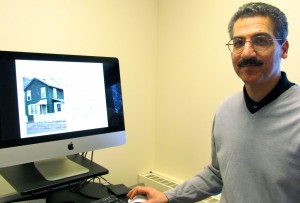

Yasipour, an Iranian immigrant, killed his four-year-old daughter.
Meanwhile, Camron Amin was on sabbatical at University of Michigan-Dearborn. The history professor had no ties to Williamsport or Yasipour, but “out of the blue” as he called it, Amin received a phone call from the suspected murderer’s attorney.
An expert in Iranian studies, Amin was asked by the defense team to provide insight into the cultural background that Yasipour could have been exposed to while growing up in Iran. Yasipour’s attorney hoped to use cultural background to prove his client’s “deranged state of mind,” but he also worried prosecutors would use his client’s ethnicity to prove his “cold, calculating state of mind,” Amin said.
The stakes were high, as Yasipour faced first-degree murder and the death penalty.
“If one looked at him through the lens of modern Iranian or Islamic culture, would he seem more or less deranged?” Amin said. “It was not just an academic question; his life depended on the answer.”
The judge eventually dropped the death penalty and Amin was not required to testify in court.
In 2006, Yasipour was found “guilty, but insane” of third-degree murder, possession of an instrument of crime and tampering with evidence. A judge sentenced Yasipour to spend at least 21 years behind bars.
And while Amin initially had no ties to the case, this particular Pennsylvania murder trial sparked a lengthy research project that eventually will culminate in a book about Yasipour and how the convicted murderer’s cultural background factored into his situation.
“I’m not a journalist,” he said. “I’m just trying to understand certain things about the case.”
After sentencing, Amin has sifted through hundreds of pages of court transcripts and media clips to learn more. Amin’s research also involved a trip to a Pennsylvania prison, where he interviewed Yasipour.
“I’ve never spoken with anybody that I knew to be a murderer before,” he said. “I’ve never been to a prison before. There’s a certain feeling you get when you visit a prison. When I left there, I just had to return to my hotel room, close the curtains and sleep.”
Amin’s past research has involved oral histories, but nothing to this extent. His expertise in Iranian studies propelled him into a unique situation that he never expected—serving as a cultural expert in a murder case.
“People often think of university professors and their research as being detached from the ‘real’ world and of mattering to no one other than a small handful of scholars interested in the same narrow topic,” said College of Arts, Sciences, and Letters Dean Martin Hershock. “Professor Cam Amin’s work demonstrates just how connected scholarship and ‘real’ life often are. This was a case that received national attention and the fact that the attorneys in this case sought out Professor Amin speaks volumes about his reputation and the work that he does.”





